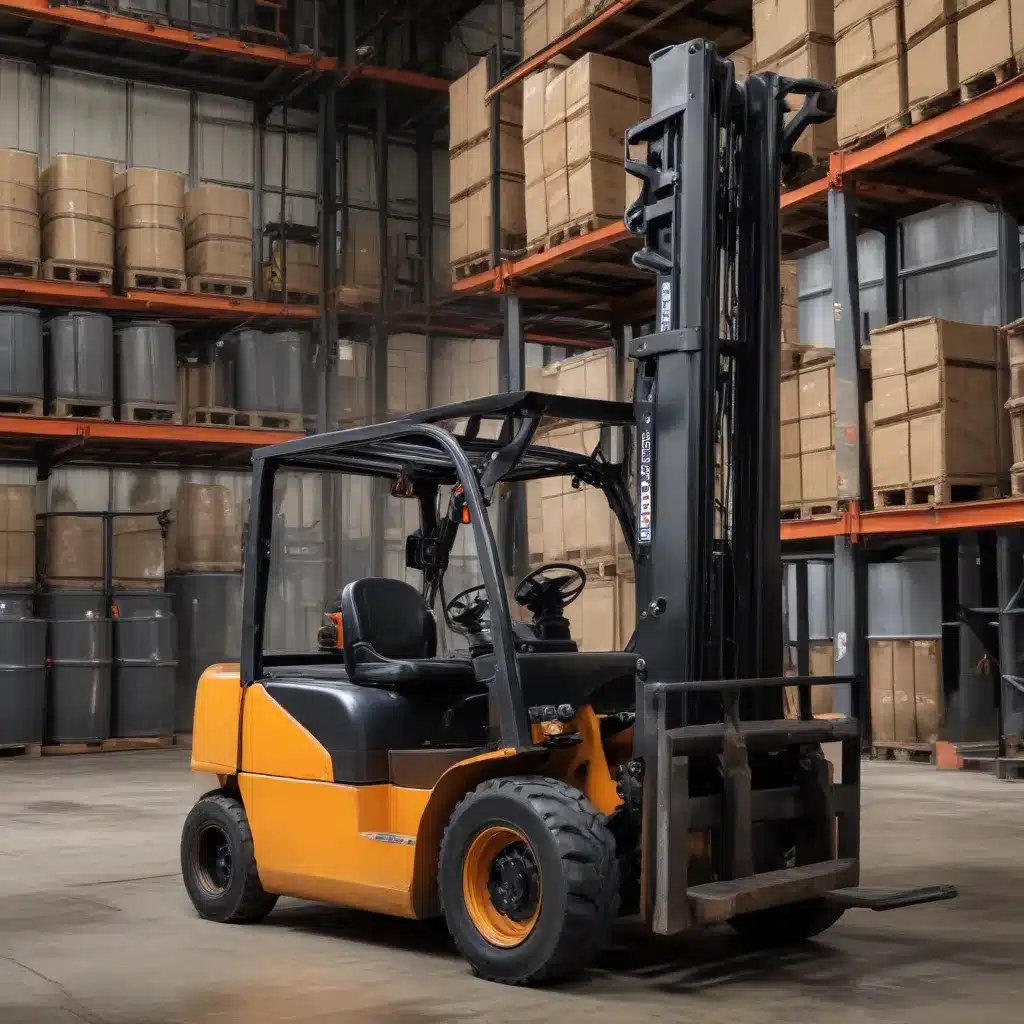
Understanding the Importance of Forklift Hydraulic Fluid
Forklifts are the backbone of many warehouse, manufacturing, and logistics operations, enabling the efficient movement and handling of heavy loads. At the heart of these versatile machines lies a critical component – the hydraulic fluid. Without properly maintained hydraulic fluid, a forklift simply cannot function effectively, putting productivity and safety at risk.
Hydraulic fluid plays a vital role in the smooth operation of a forklift’s lifting and maneuvering mechanisms. It provides the necessary lubrication, pressure, and power transmission to the forklift’s hydraulic system, including the cylinders, pumps, and valves. Ensuring the right hydraulic fluid is used and maintained at the proper levels is essential for optimal forklift performance.
Monitoring and Maintaining Hydraulic Fluid Levels
Regularly monitoring and maintaining the hydraulic fluid levels in your forklift is a key aspect of proactive maintenance. By following a few simple steps, you can ensure your forklift’s hydraulic system remains in top condition:
-
Use a Dipstick to Check Oil Levels: Locate the dipstick, typically near the hydraulic fluid reservoir, and check the fluid level. Ensure it falls within the recommended range specified by the manufacturer.
-
Top Up Fluid as Needed: If the fluid level is low, add more hydraulic fluid, being careful to match the type and grade recommended for your forklift model. Overfilling can be just as problematic as underfilling, so pay close attention to the fluid level.
-
Schedule Regular Fluid Changes: Most forklift manufacturers recommend changing the hydraulic fluid every 1,000 hours of operation or annually, whichever comes first. Refer to your forklift’s user manual for the specific maintenance schedule.
When changing the hydraulic fluid, be sure to dispose of the used oil properly and refill the system with the correct type and quantity of new fluid. Mixing incompatible fluids or using the wrong grade can lead to serious issues, so always match the new fluid to the manufacturer’s specifications.
Identifying and Addressing Hydraulic Fluid Issues
Regular monitoring and maintenance of your forklift’s hydraulic fluid can help you identify and resolve potential problems before they escalate. Some common issues to watch out for include:
-
Contamination: Dirt, debris, or water can contaminate the hydraulic fluid, leading to clogged filters, stuck valves, and reduced lubrication. This can significantly impact the forklift’s lifting capacity and responsiveness.
-
Fluid Degradation: Over time, the hydraulic fluid can degrade, losing its viscosity and lubricating properties. This can result in increased wear and tear on components, affecting the forklift’s overall performance.
-
Fluid Leaks: Leaks in the hydraulic system, often caused by worn seals or cracked components, can lead to a gradual loss of fluid, resulting in inadequate pressure and reduced lifting capacity.
If you notice any of these issues, it’s essential to address them promptly. This may involve replacing the hydraulic fluid, repairing leaks, or performing more thorough inspections and maintenance on the forklift’s hydraulic system.
Choosing the Right Hydraulic Fluid
When it comes to hydraulic fluid, one size does not fit all. Forklift manufacturers provide specific recommendations on the type and grade of hydraulic fluid to use in their machines. Factors such as viscosity, additives, and compatibility with the forklift’s components all play a crucial role in ensuring optimal performance and protection.
Always consult your forklift’s user manual or the manufacturer directly to determine the recommended hydraulic fluid specifications. Using the wrong fluid can lead to a variety of issues, including reduced lubrication, increased wear and tear, and even damage to the hydraulic system.
The Benefits of Regular Hydraulic Fluid Maintenance
By proactively maintaining your forklift’s hydraulic fluid, you can enjoy numerous benefits that contribute to overall operational efficiency and longevity:
-
Improved Lubrication: The hydraulic fluid forms a protective film on the moving parts, reducing friction and wear, which in turn extends the lifespan of the components.
-
Enhanced Heat Dissipation: The fluid helps dissipate the heat generated during operation, preventing overheating and component damage.
-
Contaminant Removal: The hydraulic fluid acts as a cleaning agent, trapping and carrying away dirt, debris, and metal particles that could otherwise cause damage to the system.
-
Reduced Downtime: By addressing hydraulic fluid-related issues before they escalate, you can minimize unexpected breakdowns and unplanned downtime, keeping your forklift fleet operating at peak efficiency.
-
Improved Safety: Well-maintained hydraulic systems contribute to the overall safety of forklift operations, reducing the risk of accidents and ensuring the protection of both operators and surrounding personnel.
Staying Ahead of the Curve with Hydraulic Fluid Analysis
To further optimize your forklift’s hydraulic fluid maintenance, consider implementing regular fluid analysis. This proactive approach involves sampling the hydraulic fluid and sending it to a laboratory for detailed testing and evaluation.
Hydraulic fluid analysis can provide valuable insights into the condition of your forklift’s hydraulic system, including:
- Identifying any contaminants or impurities present in the fluid
- Determining the fluid’s viscosity and lubricating properties
- Detecting signs of component wear or potential issues
- Monitoring the overall health and performance of the hydraulic system
By regularly analyzing your forklift’s hydraulic fluid, you can make informed decisions about when to change the fluid, identify potential problems before they escalate, and ensure your machines continue to operate at their best.
Conclusion
Maintaining the integrity of your forklift’s hydraulic fluid is a critical aspect of proactive maintenance. By following best practices for monitoring fluid levels, replacing the fluid at recommended intervals, and addressing any issues promptly, you can maximize the performance, safety, and lifespan of your forklift fleet.
Remember, the health of your forklift’s hydraulic system is directly tied to the quality and condition of the hydraulic fluid. Stay vigilant, adhere to manufacturer guidelines, and consider implementing regular fluid analysis to keep your forklifts running smoothly and efficiently. Visit Forklift Reviews for more insights and practical tips to optimize your material handling operations.

